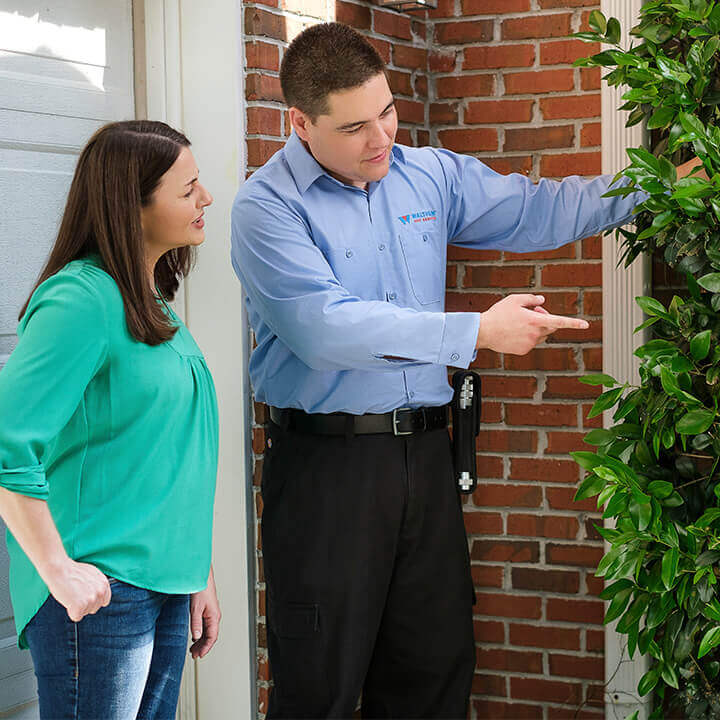There has been a lot of talk about natural pest control, green pest control, and organic pest control. No matter what you call it, you need information about it from the experts to make informed decisions about it. You should know the difference between those words, what they mean, and why the concept seems to have gained popularity recently.
You may also be wondering why we decided to start offering green pest services. It’s a fair question, too. So, we sat down with Hope Bowman, our Board Certified Entomologist to get the skinny on it. You may be surprised that we have been using many green methods for a while now.
Q. Hi Hope! Thanks for speaking with us. First, let’s start with you. How long have you been with Waltham Pest Services and what are your credentials?
A. I have been with Waltham since 2019, but I’ve been in the pest management industry since 2004. I have a Master of Science in Entomology, and I’m a Board Certified Entomologist.

Q. We are sold that you are a pro! Let’s get into green pest control topics now. Starting with the most pressing question: Why is Waltham Pest Services suddenly offering green pest services to its customers?
A. It may seem like we are suddenly offering them when, in fact, Waltham has practiced Integrated Pest Management for years. We use our knowledge of pest biology to prevent pests from getting into our customers’ homes. Our new program takes this a step further and with better, more effective green products now available on the market, we thought now was the time to officially offer a green pest service.
Q. Thanks for that answer. Makes sense. Here’s a question. Was what you were using on homes before this toxic or unsafe?
A. All of our technicians are thoroughly trained on an ongoing basis to ensure that the products used are applied according to the product label to help reduce any issues to you, your family, and your pets. The low rate of mixing, the targeted location of treatment, and instructions your technicians give you at the time of service such as staying out of areas until dry are all steps that reduce risk and keep your home safe from pests. So, while the products can be toxic to pests, we know the ways to use them so they are safe in your home at the same time.
Q. Did you use rodenticide? We’ve heard about this being toxic to hawks that may eat the mice that ingest it.
A. For green services, we do not use rodenticides. Instead, we use Integrated Pest Management tools such as sealing entry points to your home, using traps, and making recommendations on things the homeowners can do to prevent rodents. We use limited rodenticides for our original Home Care Plan but only as a tool when necessary and we always use tamper-resistant rodent stations.
Q. Well, that’s a relief! So, let’s talk about the green pest products you’re referencing. Do they work? Like – really work?
A. Yes, they do work! Green products work well against insect pests and help to reduce the future population that would otherwise be present without our intervention. Green products have been known to not last as long, but our trained technicians know where to apply these green products, so they last for as long as possible. For example, where they are less likely to be affected by rain and sunlight that break down all products – whether they’re green or not!
Q. Sounds like good news to us. Does it cost more?
A. Green home care does cost a bit more, but that’s because you will be getting more. The number of services will increase from three to four treatments, so we are sure those green products keep on working for you throughout the year. You will be getting our most experienced technicians who have gone through the rigorous GreenPro certification through the National Pest Management Association and have been trained to use all methods available to tackle any pests you may have.
Q. So, knowing that, can you do one-time green treatments?
A. We do not recommend one-time green treatments because this program is to be utilized throughout the year. Treating early in the season to reduce the insects around your home to prevent the next generation of pests to sealing holes, cracks, and crevices in and around your home at the end of the season to prevent rodents are all important components of this program. They all work better together rather than as a one-off.

Q. Are the products organic? Green? Both? What’s the difference?
A. We do use some products with organic ingredients, but our program uses all green products. Organic products are made up of a list of ingredients that was developed by the U.S. Department of Agriculture for Organic certification for the food chain. Not all these ingredients work well or are designed for a home with pets and kids. We strive to keep your family safe from pests while limiting your family’s contact with the products we use. Our definition of green is to utilize products that are botanically derived, baits that are low-risk due to their formulation, dusts that are desiccants – which means they will last indefinitely as long as they don’t get wet and can be blown into crevices away from people and pets, mechanical traps, and – most importantly – exclusion and sanitation recommendations to prevent pests from being drawn to your home.
Q. Do you use ultrasonic pest repellers? Are ultrasonic pest repellers effective?
A. We do not use ultrasonic pest repellers. We base our programs on science, and these repellers have not shown good efficacy for repelling pests. Time honored methods of Integrated Pest Management is what we use because we know it works.
Q. What is natural pest control? Is it any different than the green pest control you’re talking about?
A. The most ideal type of natural pest control uses the natural biology of the pest to prevent it from your home. For example, making sure plant branches are not touching your house prevents ants from trailing into your home. We’ve been providing this type of information for years now. Natural pest control would use natural products, which we do utilize, including botanical products. And we also use products that are effective and low risk based on the location of placement and formulation. So, natural isn’t all that different than green.
Q. We get a lot of questions about safety. Could you answer these: Is pest control safe for dogs, cats, and other pets? Is this natural pest control safe for infants? Is pest control safe during pregnancy? Is pest control safe for humans? Is pest control safe for babies?

A. Pests can cause major health issues for our pets and for us including diseases transmitted by cockroaches, ticks, mosquitoes, and flies. The risk of having these pests are much higher than the risk of having pest control. We utilize Integrated Pest Management in order to reduce the number of products needed in the first place. If your pest issue does need products, we use them at a very low percentage targeted to the smaller size of the pests we are controlling. The amount we need to take care of an ant is tiny compared to a dog or human. We never use enough to be harmful to anyone but the pest we are targeting. If you are ever not sure, we can provide information to your pediatrician or veterinarian before any treatments are performed. Safety is our priority, too.
Q. This was all great info, Hope. Thanks so much for taking the time to set us straight on all of this. We know organic pest control, natural pest control, and eco pest control are on everyone’s minds right now. So, hearing from an expert in the field really puts it all into perspective. Is there anything else you’d like to add?
A. All of these names can be very confusing, but I think you’ll agree that as a homeowner you’re looking for a program that will help prevent pests from your home, keep your kids and pets safe from these pests, and reduce your impact on the environment. That is the true reason we are offering our Green Home Care Plan.
Thank you to Hope for sitting down with us and helping us navigate the world of green pest control including what it is and what it isn’t. Contact us if you think you and your home could benefit from green pest control at your home like Hope mentioned.